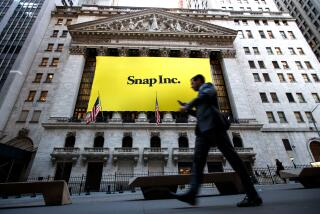BlackBerry buyout collapses, putting new pressure on it to remake itself
With BlackBerry’s latest upheaval, the troubled company is again facing pressure to ditch its smartphones.
In a stunning turn of events, BlackBerry announced Monday that a tentative deal to sell itself to a Canadian financial services holding company for $4.7 billion had collapsed, that it was no longer for sale and that Chief Executive Thorsten Heins was being replaced.
Shares of BlackBerry plummeted, closing down $1.27, or 16.4%, to $6.50. Its stock has fallen 45% this year.
John S. Chen, former chairman and chief executive of business software company Sybase Inc., will serve as interim chief executive while BlackBerry searches for a new CEO.
“BlackBerry is an iconic brand with enormous potential — but it’s going to take time, discipline and tough decisions to reclaim our success,” Chen said in a statement. “I look forward to leading BlackBerry in its turnaround and business model transformation.”
In recent months BlackBerry has been searching for a way to right itself, including shopping itself around to several potential buyers.
In September, BlackBerry reached a preliminary deal to sell itself to Fairfax Financial Holdings, which planned to take the company private.
But Fairfax was apparently unable to secure financing for a buyout and has abandoned those plans. Instead, it will lead a $1-billion investment in BlackBerry. Barbara Stymiest, chairwoman of BlackBerry’s board, said the financing “provides an immediate cash injection on terms favorable to BlackBerry.”
Tech analysts, however, expressed doubts that BlackBerry’s latest shake-up would save the distressed company.
“Fairfax’s investment will buy the company some time, which it badly needs, but the company needs a new strategy more than ever,” said Jan Dawson, chief telecoms analyst at research firm Ovum.
Already many are speculating that Chen will become the Waterloo, Canada, company’s permanent CEO and, with his background in enterprise and mobile software, will probably look to quickly spin off or sell BlackBerry’s floundering device business.
“Selling handsets at a loss is not a great business,” said Colin Gillis, an analyst at BGC Financial. “Maybe they can pivot into a successful cloud-based enterprise software company. It’s not going to happen overnight. I expect a long and messy restructuring.”
If the company does get out of the device-making business, BlackBerry-branded smartphones — for years a staple in professionals’ pockets and purses — would eventually disappear from the marketplace, much like the once-ubiquitous Palm hand-held devices, which became a technology relic in the age of smartphones.
Analysts said they hope BlackBerry will continue to provide support for existing devices that break or have technical problems, perhaps by providing repairs or refurbished phones for a while, but said it was unclear what the BlackBerry game plan would be in such a situation.
What is evident is that BlackBerry is gearing up for a major overhaul of its business.
Its enterprise software services unit is still performing well and could become the backbone for the brand, with customers using third-party smartphones that would run BlackBerry’s proprietary software. That way, consumers would still have access to BlackBerry’s highly regarded security features and BBM, its popular messaging service.
“The services business could potentially generate a billion or more in cash next year if you slow the decline of the subscribers and the average revenue per user,” said Scott Thompson of FBR Capital Markets.
BlackBerry has been desperately trying to remake itself while watching its sales erode as subscribers opted for other smartphone brands.
Its BlackBerry 10 operating system, a major product launch for the company that was considered its last-ditch attempt at a turnaround, has been largely a disappointment since its debut in January. Although tech experts have given the OS and new devices positive reviews, many said the changes simply came too late.
“BlackBerry tried to remake itself and so far has failed,” industry analyst Jeff Kagan said in a note to investors. “Right now there are no real answers for BlackBerry.”
As part of BlackBerry’s new plan, Heins will also step down as a member of the board. He had been CEO for less than two years and was largely unpopular among analysts and tech watchers, who criticized him for a lack of vision and inability to end BlackBerry’s downward spiral.
“He was put in a very precarious position when he took over BlackBerry, and I think he did the best that he could,” Thompson said. “It just wasn’t quite enough in the end.”
After striking the tentative deal with Fairfax, BlackBerry continued to meet with potential buyers.
Google Inc., Lenovo Group Ltd., Cisco Systems Inc., SAP and Samsung Electronics Co. had been rumored as potential buyers for bits and pieces of BlackBerry’s business, and company officials even met with Facebook executives late last month. BlackBerry co-founders Mike Lazaridis and Douglas Fregin also considered a bid for the company, but an offer didn’t materialize.
BlackBerry said that the $1-billion investment is expected to be completed within two weeks and that Fairfax would contribute $250 million. It did not identify the other investors.
“The cash injection will give management enough money to operate for approximately another six months, maybe longer,” Thompson said. “But it could also signal there wasn’t a buyer in the market nor was this a business that was stable enough to allow some of the firms that were trying to raise money to get this deal done.”
As it grappled with an uncertain future, BlackBerry continued to struggle. In September the company announced that it planned to lay off about 4,500 employees, or about 40% of its workforce, and reported that it lost nearly $1 billion in its most recent quarter.
Once the Fairfax-led transaction closes, Chen will be appointed executive chairman of BlackBerry’s board. Prem Watsa, chairman and CEO of Fairfax, is rejoining the board and will be appointed lead director and chair of its compensation, nomination and governance committee. David Kerr, a director since 2007, will step down.
Twitter: @byandreachang






